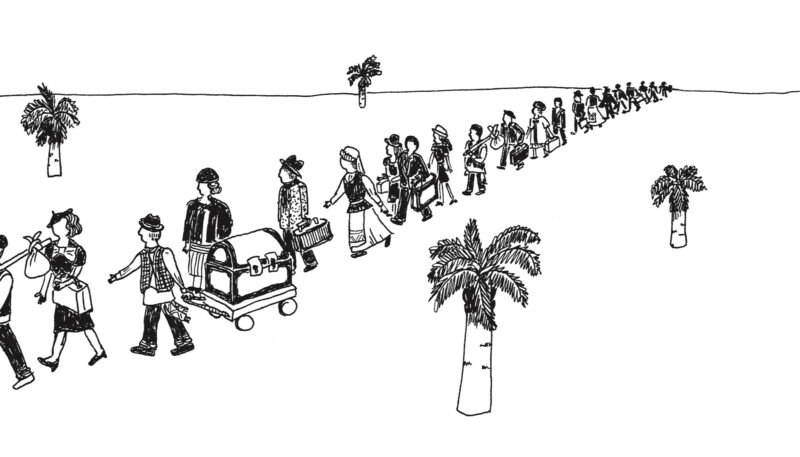100 Years in One Month: A Portuguese-Speaking Lithuania in Africa

Birutė Bikelytė‘s illustration (fragment)
Lithuanian never had any aspirations to becoming a colonial power. At the end of the 18th century it in fact was divided among three empires and finally collapsed. The emerging democratic state of Lithuania in the 20th century thought more about how to fit into an ethnographic area rather than about any overseas territories.
However, in the 1930s the subject of colonization came up unexpectedly in the agendas of Lithuanian politicians and scholars. This process was begun to be thought about in addressing problems of a geopolitical nature and in particular those raised by emigration. It is calculated that from the and of the 19th century one fourth of all Lithuanians – about a million of the population – might have emigrated, mostly to Western Europe, North and South America. And for this reason, thought was given to how to bring together all the Lithuanians scattered throughout the world into specific territories where they could create communities, not lose their Lithuanian identity and maintain close economic and cultural links with their home country – the Lithuanian state.
Most probably the most vocal proponent of these visions could be held to have been Professor Kazys Pakštas (1893–1960). He prepared several detailed colonization plans. According to him, Lithuanians should move to a country in which there should be the least possible competition with representatives of the white race, a favourable climate and one closer to the one in Lithuania, cheap land, and the territory would be ruled by a comparatively small colonial power-mother country.
In the professor’s opinion, the country that best fitted the above-mentioned requirements was Portuguese-controlled Angola. In order to populate the western territories of this African country it was necessary to carefully prepare the first pioneers: agronomists, doctors, teachers and priests, to use for this purpose about a thousand Lithuanian emigrants already living in Brazil and who already knew Portuguese so that they could become the nucleus of a larger emigration to this Portuguese colony. According to Pakštas, a colony abundantly populated by Lithuanians outside the borders of Europe could also serve as a ‘back-up Lithuania’. The geographer perspicaciously predicted that the existence of the Lithuanian state between the USSR and Germany did not have bright prospects.
The lack of the enormous funds that would be needed and the beginning of World War II stopped the implementation of plans for targeted colonization, but the idea of a Lithuania in Africa was finally implemented in the 21st century. However, it was not Angola that was ‘colonized’, but Madagascar. In 2004 the premiere of the production of Marius Ivaškevičius’s play Madagaskaras (Madagascar), directed by Rimas Tuminas, took place at the State Small Theatre of Vilnius. Presented in it are Pakštas’s ideas of colonization and the visionary spirit of Lithuanians. Tuminas’s theatrical ‘colonization’ is still popular, while the text of Ivaškevičius’s play has been included in school literature syllabuses.
Norbertas Černiauskas